|
| |
| |
| Aug 16, Friday @ Ellen Stewart Theater, La Mama, 74A 4th Street, NYC |
| |
| EVENING CONCERT PROGRAM: 7 - 9:30 pm
|
Audience welcome by Aroon Shivdasani
Rajika Puri: Narrator ('carrier of the thread' or Sutradhar) |
| |
| Tickets: $35 general admission; $30 IAAC members. |
 |
| FESTIVAL PASS: $55 general admission $50 IAAC members |
 |
| Includes tickets to every Erasing Borders Festival of Indian dance event from August 15-17, 2013. |
|
|
| |
| Ashtapadi - "Lalita Lavanga . . ." |
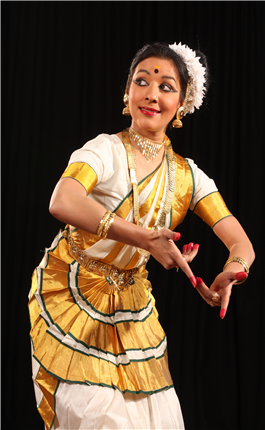 Dancer: Vijayalakshmi Dancer: Vijayalakshmi
Choreography: Bharati Shivaji
Music: Sadanam Radhakrishnan. Raaga Poraneeru followed by Vasantha
Lyrics: Jayadeva
An extract from the great 13th C poem Gita Govinda by Jayadev, about the divine lovers Radha and Krishna, these verses describe the beauty of spring, season of love, and the longings of lovers.
|
| |
| Beyond Grace Montage |
Dancer: Vijayalakshmi
Choreography: Vijayalakshmi
Music: Mac Quayle (derived from Mohiniyattam repertory) with Vijayalakshmi speaking rhythmic syllables.
This dance is inspired by the soundtrack of Beyond Grace, a documentary feature film about Vijayalakshmi and her mother Bharati Shivaji's journey through Mohiniyattam. Starting with the typical south Indian (Carnatic) Raga Mohana, it transitions into an invocation (Stuti) to Shiva and culminates with a popular song from Kerala's Kaikuttikali folk dance tradition. |
| |
| Fretless |
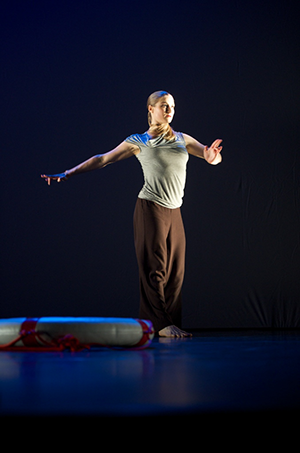 Dancer: Kamala Devam Dancer: Kamala Devam
Choreography: Kamala Devam with movement quotes in last section taken from Rashpal Singh Bansal's “Anything But Exotic” (2007)
Music: Colin Hay, Derek Trucks, Cold Play
Original sound design: Benjamin Henry Edwards (assisted by Kamala Devam)
Original Lighting Design: Angela Anson
Vocal Recording/Sound Engineering: Lesley Mommsen
Vocals: Kamala Devam
Costumes: Next, Marks and Spencer
Prop: Arthur Beale Sailing Shop
Fretless is a contemporary dance solo inspired by the loss of Kamala’s friend and choreographer Rashpal Singh Bansal. The dance uses Bharatanatyam and contemporary dance's athletic release-based vocabularies to delve experiences of trying to save someone, being the one who needs to be saved and of letting go of what keeps one safe - or perhaps trapped.
|
| |
| Ardhanariswara |
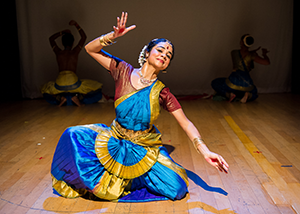 Dancers: Kadhambari Sridhar, Malini Srinivasan and Umesh Venkatesan Dancers: Kadhambari Sridhar, Malini Srinivasan and Umesh Venkatesan
Choreography: Malini Srinivasan
Music: Roopa Mahadevan, with rhythmic compositions (Jathis) by Akshay Anantapadmanabhan
(commissioned by Malini Srinivasan) in Ragamalika; Talas Adi, and Misra Chapu
Lyrics: Adi Sankara (788-820 CE)
"The Lord who is Half-Woman" (Ardhanarishwar) is a composite of Shiva and Shakti. This work celebrates the Oneness of the Two - Male and Female - through abstract dance, rhythm, melody and text. In the first half, the male and female dancers each express the essence of energetic or vigorous qualities (Tandava) and sensuous, flowing qualities (Lasya). As the rhythmic sections begin to converge in a traditional mridangam Koraippu, their movements also converge. The second half introduces a third dancer who represents both the composite male/female form as well as the devotee in wonder who recollects the astonishing attributes of this Divine Being.
|
| |
| INTERMISSION |
| |
| Priye Charusheele |
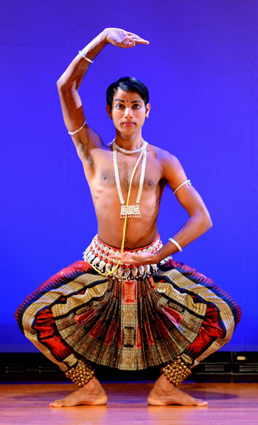 Dancer: Rahul Acharya Dancer: Rahul Acharya
Choreography: Rahul Acharya
Music: Traditional, in Raga Desh; Tala Rupaka
Lyrics: Jayadeva (Gita Govinda)
Having spent the night with another woman, Krishna returns to the eagerly waiting Radha, who, by now is angered by Krishna's flirtatious nature. She shuns him and pleads with him to leave her alone. Chastened by Radha's anger, Krishna devises ways to woo her back. But his cunning words do not convince her. Facing imminent failure, Krishna falls at Radha's feet and asks her to place her lotus feet on his head. ( "Dehi pada pallavamudaram"). It is said that while attempting to write these lines, Jayadeva was deeply conflicted by the impropriety of what he was to represent i.e. that the Lord of the World begging Radha (a Devotee herself) to allow Him to touch her feet. Jayadeva was rescued from his turmoil by divine intervention when Krishna himself completed this couplet.
|
| |
| Taal Chakra |
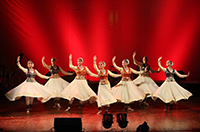 Dancers: Barkha Patel, Nikita Manilal, Alisha Kothari, Ashna Kothari and Ashna Mehta of the Rachna Sarang Academy of Performing Arts Dancers: Barkha Patel, Nikita Manilal, Alisha Kothari, Ashna Kothari and Ashna Mehta of the Rachna Sarang Academy of Performing Arts
Choreography: Guru Rachna Sarang
Music: Padmavibhushan Pandit Birju Maharaj, Tala Teentaal
Vocal syllables (Bol Padant): Guru Madhurita Sarang
Interpreting the Philosophies of Kabir and Ameer Khusrao
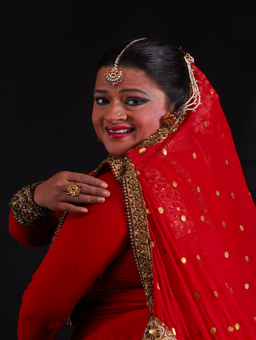 Dancer-Composer: Rani Khanam Dancer-Composer: Rani Khanam
Music based on Poems by Kabir and Ameer Khusrao
In the poem, Rehna Nahi Desh Begana Hai, the iconoclastic 15th century mystic Kabir reminds us that this world that we call our home is just temporary. Why do we fear death when merging with the Absolute is the only constant space? (This song will be rendered in the baithak or seated mode.)
Writing the still popular song, Mohe Apne Rang Mein Rang Le Rangeele, a hundred years earlier, the Muslim Sufi saint Amir Khusrao pleads with his Beloved (the Almighty) to transform his material, monochromatic self by dyeing his being in the joyful spring colors of His Creation.
With the two danced poems, one from each of these iconic figures, Rani draws parallels between two great mystic traditions of India: Bhakti and Sufism, which both place a personal relationship with the Divine (Nisbat) above all else.
|
| |
|
| Q&A with dancers moderated by Rajika Puri |
| |
 |
for the indoor concert . |
| $35 general admission; $30 IAAC members |
|
| |
FESTIVAL PASS: $55 general admission $50 IAAC members

Includes tickets to every Erasing Borders Festival of Indian dance event from August 15-17, 2013. |
| |
|
|
|
| The Indo-American Arts Council is a 501 ©3 not-for-profit secular arts organization passionately dedicated to promoting, showcasing and building an awareness of artists of Indian origin in the performing arts, visual arts, literary arts and folk arts. For information please visit |
| |
|







